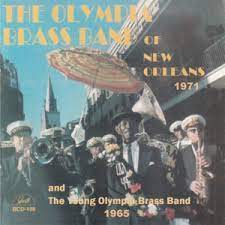
Daily Dose Of Jazz…
Paul Crawford was born on February 16, 1925 in Atmore, Alabama, to parents who were a Baptist minister and a music teacher. After serving in the Navy during World War II he graduated from the Eastman School of Music in Rochester, New York where he studied trombone in a classical style. He went on to study under trombonist and teacher Emory Remington, pursued for a time graduate studies at the University of Alabama. Moving to New Orleans, Louisiana in 1951 he became a specialist in the Dixieland style of Jazz.
Crawford initially took up residence in the French Quarter of New Orleans where he became acquainted with people in the local arts and music scene. He also started performing at the New Orleans Jazz Club and learned to play Dixieland. Soon after he became co-bandleader of the Crawford-Ferguson Night Owls, with Leonard Ferguson, frequently performing on the steamboat President.
He made his first recordings on trombone in 1957 with the Lakefront Loungers. During this time, Paul played the trombone on non-paying gigs, and participated in jam sessions. He performed with Sharkey Bonano and with bandleader Paul “Doc” Evans.
By the 1950s, with Deep South laws prohibiting white musicians from performing with Black musicians, jobs dried up. As these laws were struck down in the 1960s, opportunities opened up for Crawford to perform with various notable Black jazz musicians in New Orleans. In 1964, Crawford was approached by Allan Jaffe, who was the owner of Preservation Hall, about performing at the Preservation Hall venue. With Punch Miller, he became a part of the Preservation Hall Jazz Band.
Shortly thereafter, he became a part of the Olympia Brass Band, marched in many New Orleans Jazz Funerals and often performed with the baritone horn. He was a founding member of the New Orleans Ragtime Orchestra. As a member of this group and others, he helped make the soundtrack for the movies “Pretty Baby” and “Live and Let Die”, as well as many other recording sessions. Crawford played the baritone horn in many performances of the musical “One Mo’ Time”.
Crawford was an associate curator at the Tulane University Hogan Jazz Archive. As curator, conducted numerous interviews for an oral history of jazz, and resurrected many forgotten pieces of jazz music and developed arrangements of them. He also developed a significant number of photos of jazz musicians and performances, in a private collection.
Trombonist, baritone hornist, arranger and music historian Paul Crawford, who specialized in Dixieland jazz, transitioned on July 31, 1996 of lung cancer. He had been living in a New Orleans skilled nursing facility at the time.
More Posts: arranger,bandleader,baritone horn,curator,historian,history,instrumental,jazz,music,trombone


